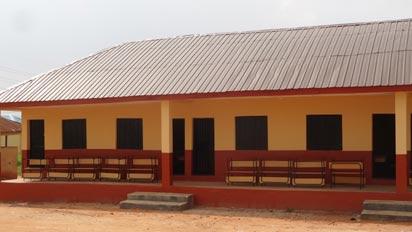
•The newly built Farm Settlement Primary School
By Oluwatobi Alabi
PROFESSOR of Public Administration and independent scholar, Professor Ladipo Adamolekun, has stated that the adoption of public-private-partnership in the near future would turn around the fortunes of primary and secondary education.
According to him, though the constitution, in Section 18 (3) states that the responsibility of the government is to eradicate illiteracy, and to this end, when practicable provide: (a) free, compulsory and universal primary education; (b) free secondary education; (c) free university education, prevailing circumstances are far from this provision.
He pointed out that the “Compulsory, Free, Universal Basic Education Act, 2004” – which is the closest action in compliance with (a) and (b) and has the following objective: “the federal government’s intervention under this Act shall only be an assistance to the states and local governments in Nigeria, for the purpose of uniform and qualitative basic education throughout Nigeria.”
Even at that, he stated that after reviewing the implementation of the UBE Act a few years ago, he has come to the conclusion that the Act should be repealed and the share of national revenues hijacked by the federal government should be shared among the states and local governments.
Delivering his keynote address at the Supreme Education Foundation Schools’ 25th anniversary titled ‘Selected Issues in Primary and Secondary Education’ in Lagos, Prof. Adamolekun observed that statistics and current practical experiences are clear indications that government alone cannot deliver on its constitutional mandate as far as primary and secondary education are concerned.
Adamolekun reasoned that sub-national governments should have full responsibility for achieving quality basic education (interpreted as 9 or 12 years), advising that the federal government’s role in primary education should remain limited to prescribing minimum standards as provided in the Constitution’s Second Schedule, Exclusive Legislative List, 60 (e).
Contrary to the constitutional provision, he expressed doubts that any state has concluded that it is practicable today to provide both “free, compulsory and universal primary education” and “free secondary education.”
Justifying his doubt with statistics from a state in the South-west, he pointed out that there are almost as many children in private primary schools as there are in public primary schools (317,519 and 320,455 pupils respectively).
Still relying on this statistics, he pointed out that enrolment in public schools for secondary education is significantly higher than in the private schools (234,395 and 129,583 students respectively, with the latter constituting only a little over 35% of total enrolment). Notwithstanding this gap in secondary school enrolment, there are more private secondary schools than the public secondary schools, 326 and 304 respectively.
While acknowledging that the South-west state cited as an example may not be the universal representative of the prevailing situation across the 36 states of the federation, he opined that it could be fairly representative of the situation in at least one-third of the states of the federation.
Professor Adamolekun declared that his highlighted experience shows that the private sector is a very important provider of primary and secondary education on a ratio 50:50 share in primary and 35:65 in respect of the case of secondary education respectively.
Disclaimer
Comments expressed here do not reflect the opinions of Vanguard newspapers or any employee thereof.